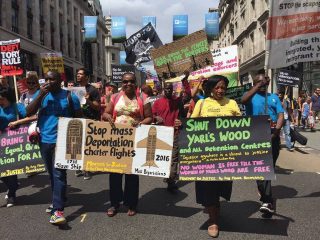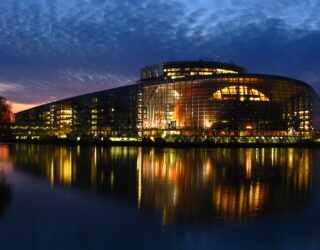With demonstrations at the Nigerian and the Jamaican High Commission, marches through Brixton and Peckham and in solidarity with international students, members of Movement for Justice By Any Means Necessary are starting the year active. The group, who have campaigned against the UK’s immigration detention and deportation system, particularly focusing on women detained at Yarl’s Wood, have sought to build grassroots resistance in the communities most affected.
Groups like Movement for Justice haven’t waited around for robust parliamentary opposition to post-Brexit xenophobia and the harmful ‘hostile environment’ policies of Theresa May and have instead worked hard where it matters most:
The Movement for Justice is building a movement of action rooted in our communities, with wide support and with those at risk of deportation playing a leading role. Organised mass community action is the only force that can stop raids, deportations, charter flights, and turn the tables on the oppressive Home Office. Without the power of a movement, lawyers, MPs etc. (however supportive) face a losing battle.
The Brexit swing towards a more racist, xenophobic Britain can be defeated if we mobilise our communities in action. The leading role falls to those who best understand the racist threat of Brexit and have the most to lose and the most to win: the black, Asian, Muslim and immigrant communities and youth. If we lead in action we can change the direction of British politics and lift others out of despair of Brexit.
The challenge of charter flights.
Charter flights are very different from regular flights: they are secretive, hired by the Government for one way journeys, the passengers haven’t bought tickets, don’t want to fly and the destinations are sometimes places they have little connection to.
According to MFJ, “these modern-day slave ships are the most brutal part of the deportation industry… Charter flights deport people who have built lives in the UK, been here most of their lives, have parents, partners and children here, students who have not finished their courses, people with serious health problems and others who are carers to elderly and disabled relatives.”
In one case – a charter flight to Jamaica on Wednesday 7th September 2016 – of the 50 people who spoke to volunteers at The Unity Centre in Glasgow, almost all said they had come to the UK as a child. Zita Holbourne, co-founder of Barac UK describes speaking to a partner of one of the passengers:
In the background, as he spoke, she could hear crying, screaming and shouting from others on the flight. The pleas and cries will haunt her forever, she added; the heart has been ripped out of her family. She and her partner have seven children and four grandchildren between them, and her partner was their only grandfather. This is one family’s story, but there will be many others like this.
Accessing data on the UK’s use of charter flights for mass deportations is challenging as there aren’t routinely published figures. According to Freedom of Information requests submitted in April 2016, to which the Home Office replied in October 2016, 2,364 people were deported on charter flights in 2014 and 1,877 in 2015: about one in ten of all those deported with force through ‘criminal deportations’ or ‘enforced removals’. Behind every number, there is a story just like the one above.
2015 destinations included three flights to Afghanistan, 11 to Albania, three to Kosovo and Albania, six to Nigeria and Ghana, 14 to Pakistan and one to Morocco carrying only one passenger. Corporate Watch highlights that while media reporting typically presents charter flights as containing dangerous “criminals”, in fact “only 24% of those sent on charter flights in 2015 were criminal deportations (in 2014 it was 21%).”
According to a 2013 report titled Collective Expulsion: The case against Britain’s mass deportation charter flights, there are four key factors why the Home Office chooses to continue the practice despite the high costs – reportedly around £5,000 per person deported.
Firstly, the motivation to meet targets can be fulfilled efficiently with mass deportations of particular nationalities. To the main destinations, charter flights are scheduled at more or less regular intervals. One way these targets are met is through Immigration Control and Enforcement teams carrying out dawn raids on homes or workplaces.
Secondly, charter flights can be a means of stifling rebellion either by those who are organizing inside detention centers or those who have fought deportation back to a specific country, often because they have a life and family here or their lives are in danger. The charter flight program, carried out largely in secret on night flights out of sight of members of the public, was in part driven by attempts by detainees to delay the process at airports.
Thirdly, mass deportations have a ‘deterrent effect’ on those who remain as well as those who might yet arrive. The knowledge that at any time a person could be bundled onto a coach, taken to an airport at night and removed from the country with little means to resist fosters a climate of fear. Finally, there is the foreign policy aspect. Movement for Justice’s campaign has sought to focus not just on the UK’s actions but the complicity of target destinations, in this case Nigeria and Jamaica. Corporate Watch suggests charter flights:
have a particular symbolic value in international relations… they may be used to demonstrate that a country is now “safe” after British military intervention: as in the case of Kosovo and Afghanistan… In the cases of Nigeria, Jamaica, Pakistan and other charter destinations, these agreements may play other complex material and symbolic roles within wider trade, aid, and “security” negotiations with Britain’s former colonies.
Movement for Justice’s goals
The fortnight of protests and marches through affected communities is part of replacing “a culture of silence about ‘immigration problems’ with a culture of openness, defiance and preparation. The authorities want people to feel defensive, guilty or ashamed… If your immigration status is insecure and you are at risk of detention and deportation, discuss it with your friends & family, work colleagues, fellow students, neighbours etc, so that they are prepared and ready to support you and each other.”
Beyond the UK, MFJ hopes to draw on international connections and close ties to destination countries, challenging both sides of charter flight arrangements and calling out government complicity in the UK’s detention and deportation systems.
“We will be marching through Brixton and Peckham, mobilizing the Nigerian, Jamaican and other diaspora communities and taking the fight to the embassies to demand that the Jamaican and Nigerian governments stop colluding with Britain’s racist mass deportations.”
How to take part in the campaign:
Saturday 14th January at 12pm – March through Brixton, Meet outside the Ritzy
Tuesday 17th January at 4pm – Demonstrate at the Jamaican High Commission, 1 Prince Consort Rd, Kensington, London SW7 2BZ
Saturday 21st January at 12pm – March through Peckham, Meet outside Peckham Library
Wednesday 25th January at 11am – March to Defend International Students, meet outside SOAS
Image: Movement for Justice



